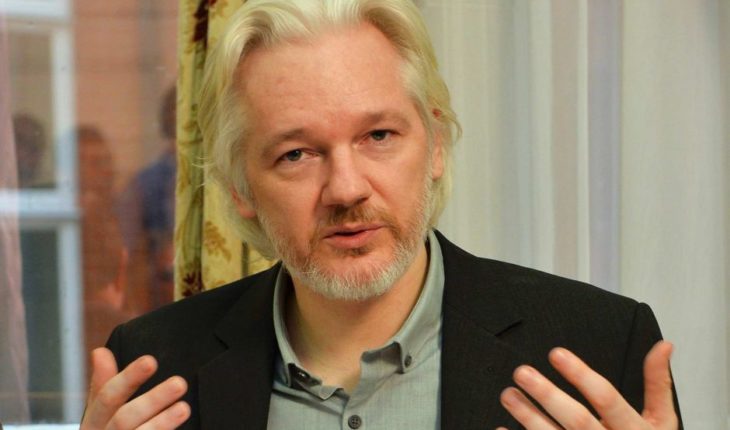the uncomfortable stay of Julian Assange in the Embassy of Ecuador in London for six years has come to an end. The confrontation lasted enough. Now, the founder of WikiLeaks should be acquitted or condemned, but not in the United States.
Moments after Ecuador withdrew him haven Assange on Thursday, he was arrested by the police in the United Kingdom on charges of violating his bail. In 2010, a court had determined that he should be extradited to Sweden to face rape and sexual assault charges. Assange, however, said fear that accusations were not just a pretext for his eventual extradition to the USA, where he could be tried for publishing State secrets.
The fear of being handed over to U.S. led him to seek asylum in the Embassy of Ecuador. Swedish investigations were discarded but the fear remained, which prompted Assange to stay in the Embassy even though he was no longer welcome and Ecuadorians were limiting their ability to communicate with the outside.
Now, the process of extradition is imminent. Last year, U.S. prosecutors accidentally revealed an indictment that had been issued against her and was sealed. It is a normal procedure when a suspect has not been arrested and the US authorities do not want to put it on notice. However, in the case of Assange, kept the indictment secret already does not serve that purpose: he knows that something is walking, even more so when Chelsea Manning, one of the key informants of WikiLeaks, is in prison since last month for refusing to testify in an investigation against Assange.
What ever the reason of U.S. authorities to keep the sealed indictment, will be forced to disclose the charges against when requesting the extradition to the United Kingdom, at least to the British judge. In accordance with the Treaty of extradition between the two countries, must show that they have reasonable suspicions against Assange.
Then, the judge will have a wide margin of decision to proceed. Assange could go free, for example, if the judge decides that the U.S. case against her is politically motivated. That could be a valid argument.
On the one hand, the Democratic Party, which has a majority in the House of representatives, has reason to be resentful with Assange, after the publication of documents of the presidential campaign of 2016 apparently stolen by Russian intelligence.
On the other hand, Trump Administration may be interested in pursuing it to show that Donald Trump had nothing to do with infiltration and not is grateful. Without a doubt, a judgment to Assange in the United States would be politically charged. However, a denial of extradition for political reasons would be the first in the relations between the United States and the United Kingdom.
The extradition treaty between the United States and the United Kingdom, signed in 2003, was heavily criticized in the latter because, as said the then Attorney general Dominic Grieve in a parliamentary hearing of 2012, “the public does not trust the criminal justice system of the United States “.”
Activists and politicians have demanded amendments, higher levels of evidence, and more protection for delivered to U.S. persons However, the Treaty has withstood criticism, and attempts of the suspects argue, for example, that the American prison system is so cruel that it violates the European protection of human rights, have been rejected both by the courts British and by the European Court of human rights.
Now the United Kingdom occasionally denies U.S. Requests for extradition. According to Government evidence presented to the British Parliament, of 106 requests between 2007 and 2014, 14 were rejected, two of them for reasons of human rights.
The Assange case requires another rejection. If, as it is likely, USA requires the founder of WikiLeaks for publishing stolen government secrets, the head lawyer at Human Rights Watch, Dinah PoKempner, waiting to be judged under the law of American espionage in 1917, which does not include exceptions for those who reveal information classified in the interest of the public.
It is not easy to defend Assange. His actions during the 2016 elections suggest a motivation other than the public interest, namely, a vengeful desire to hurt Hillary Clinton. However, most published by WikiLeaks leaks reasonably meet the definition of journalism in the public interest, of the type which resulted in the publication of the Pentagon Papers or the report from the Washington Post about Watergate. Article 6 of the European Convention on Human Rights stipulates the right to a fair trial, and it is possible to argue that deprive Assange by a defense in the interest of the public would make his U.S. trial unfair.
A high profile as the Assange case could be the chance for Americans to discuss the conflict between national security and the public interest; clearly, the decision of the Supreme Court on the Pentagon Papers in 1971 did not end point to the topic. However, drag to Assange to US to have that discussion might not be very fair with him, so to determine if it should be treated as a spy or as investigative journalist should remain in the hands of European courts.
Although the majority of published by Assange leaks came from United States, some European countries, like France and Switzerland, were also white.
Even the United Kingdom could be argued that some of the leaks exposed its secrets. Europe, where Assange publications are not as politically delicate as in USA, probably would be a fairer jurisdiction in her case. A request for extradition from another European country or a case in the United Kingdom may help to keep us away, to an independent court considers the evidence in their favor and against.
If a European Court decides that, generally speaking, WikiLeaks has acted in the interest of the public and not as a “hostile non-State intelligence service”, as called for by Mike Pompeo when he was director of the CIA, would be an opportunity for another fugitive from U.S. , Edward Snowden, leave Russia and find refuge in the European Union. United States must better protections to informants before requesting that people like Assange or Snowden are brought before their courts.
Poured in this op-ed content is the sole responsibility of the author and do not necessarily reflect the editorial line nor the counter position.





